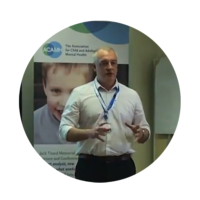Search results
-

In Conversation… Digital Interventions with Dr. Bethan Davies & Dr. Aislinn Bergin
In this podcast on Digital Interventions, Dr. Bethan Davies & Dr. Aislinn Bergin, of NIRH Mindtech, talk to freelance journalist Jo Carlowe about how these innovations can have a positive effect on young people’s mental health.
Read more -

Sleep and Mental Health
Dr Sally Hobson, Specialty Community Paediatrician, Evelina Children’s Secondary Community Sleep Clinic on the relationship between sleep and mental health.
Read more -

Autism and Attachment: A Need for Conceptual Clarity
What do we mean by ‘attachment disorders’? Is there a meaningful distinction between these disorders and ‘attachment difficulties’? And where is the overlap with autism?
Read more -

Supporting Prepubertal Children with anorexia nervosa – a clinician’s experience
Five patients under the age of twelve have presented with Anorexia Nervosa in the last six months to our community CAMHS Eating Disorders Team, in the North of England, representing 16% of our average annual caseload.
Read more -

The ACAMH story, the Board…
From its earliest inception ACAMH has attracted a diverse range of professions and individuals – all with the shared aim of improving the mental health of children and young people. Its current board reflects that more than ever with an eclectic mix of clinicians and academics who have spent their careers working to help some of the most vulnerable in our society.
Read more -

‘Building psychologically informed Forensic CAMHS’ Dr James Millington
Dr. James Millington on ‘Building psychologically informed Forensic CAMHS’
Recorded on 19 April 2019 at the North West ACAMH Branch as part a conference on Conduct Disorder.
ACAMH members can now receive a CPD certificate for watching this recorded lecture.
Read more -

Implementing iThrive? Pick priorities and prepare, says commissioner
iThrive is a care framework that aims to replace the four tiered system of CAMHS provision, by grouping children and young people based on their needs. Initially launched at 10 sites across the UK in October 2015, by April 2017 it had expanded to 44 CCGs. iThrive state that, 30% of young people in England […]
Read more -

Dyslexia and developmental language disorder: same or different?
Maggie Snowling looks at how we understand the definition, development and relationship between dyslexia and developmental language disorder (DLD).
Read more -

University Students and Imposterism: Its Relationship with Happiness, Self-Efficacy, and Perfectionism
Imposter syndrome is a pertinent issue in academia. A recent article from May 2023 titled “The imposter phenomenon and its relationship with self-efficacy, perfectionism and happiness in university students” (Pákozdy et al., 2023) sheds light on this pressing issue. This blog aims to summarise the key findings of the article, discuss its strengths and limitations, evaluate its evidence, and provide a personal perspective on how this evidence can inform practice and future research.
Read more -

Psychotherapies seem to be especially effective in low- and middle-income countries
Youth psychotherapies appear to be about twice as effective in low- and middle-income countries (LMICs) compared to high-income countries. However, disproportionately little research on youth psychotherapies has been conducted in LMICs; 90% of the world’s youth live in LMICs, but only 5% of randomized controlled trials of youth psychotherapies have been conducted in LMICs to date. Therefore, there is great need for more research on psychotherapies for youth in LMICs and for funding directed to LMIC-based investigators, clinicians, and organizations. We do not know why psychotherapies appear more effective in LMICs, but discovering why could help to identify ways of improving youth psychotherapies worldwide.
Read more